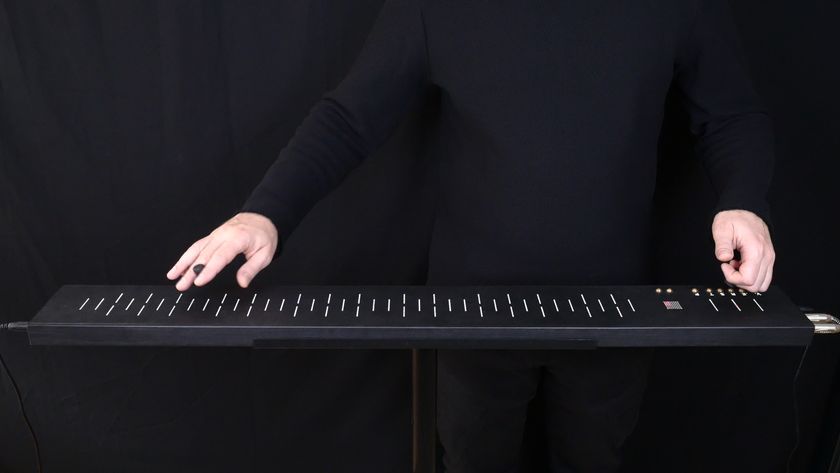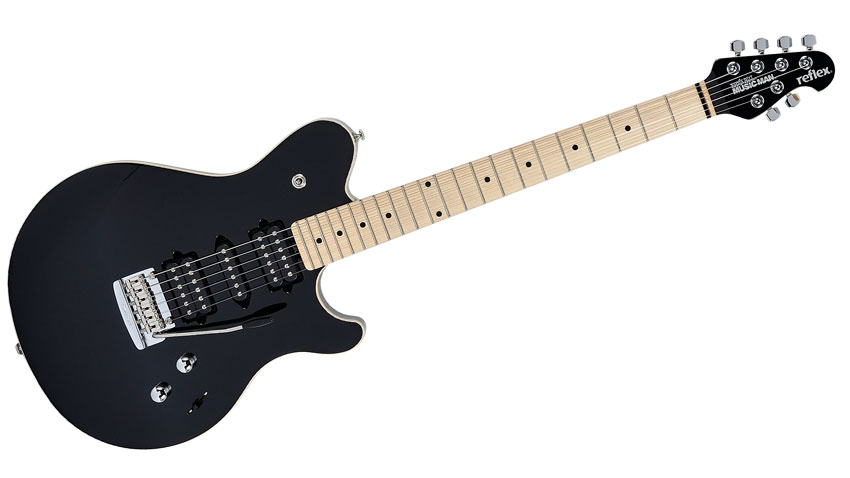MusicRadar Verdict
Time will tell whether this technology will be a real-world game changer or an interesting footnote. Regardless, this is a very good electric guitar with which to broaden your sonic horizons.
Pros
- +
A very resonant, pro-quality instrument with huge potential for the modern-minded player. Easy to use web-based interface.
Cons
- -
Technology is limited to one chassis - may alienate the vintage crowd.
MusicRadar's got your back

Music Man Reflex Game Changer HSH

Body

Controls
The phrase 'game changer' is an example of inelegant contemporary jargon most accurately reserved to describe hi-tech gadgets such as Apple's iPhone that have genuinely upended the market and revolutionised the way that a product is thought about. In simple terms, if you are going to call your new product the Game Changer, it had better be pretty special.
Music Man clearly has lofty ambitions for this technology, and its launch is a bold move in an industry still head over heels in love with the designs of the 50s and early 60s and openly scornful towards modernity. Don't believe us? Simply search for the words 'Firebird X' on any guitar forum you care to think of.
"Until now, the only way to unlock a similarly rich array of sounds involved a soldering iron or digital processing"
Music Man's Game Changer pickup switching system was first announced with a fanfare at Winter NAMM in January 2011, so it's fair to say that it has taken quite some time for the company's marquee product to make its way over to us from its San Luis Obispo facility in California.
Arguably, Sterling Ball and co should be applauded for having the stones to put their weight behind a product that boasts hundreds of thousands of potential pickup combinations when the overwhelming majority of guitar players are perfectly happy with five, or even three.
That aside, a cursory glance at Music Man's impressive artist roster, which includes such heavyweights as Steve Lukather, John Petrucci and Steve Morse, indicates that the company doesn't necessarily build instruments to appeal to the 'set and forget' school of tonehounds.
And in a wider context, for every Billy F Gibbons or Leslie West, there have always been major league guitarists for whom 'standard' wiring fails to deliver enough variation: Brian May carved a unique sonic niche with a bespoke instrument that delivers unconventional in-series and out-of-phase tones, while Jimmy Page used pull-push pots to bring more variety to the Les Paul without disrupting the classic 1950s lines of his axe of choice.
Until now, the only way to unlock a similarly rich array of sounds either involved a more than rudimentary command over a soldering iron or digital processing. The Game Changer promises automated access to "any order of pickup coils in series, parallel, in or out of phase", without digitising or modelling the audio signal.
Lead engineer on the project, Drew Montell, explains that the key to the whole concept was the idea of unlocking the limitations of the traditional pickup selector switch. He says: "We have always been developing new ways to expand the tonal possibilities of our instruments. However, during the development of our 25th Anniversary guitar and bass, we sought ways to break free from the mechanical limitations of the industry standard three- and five-way switches.
"It started with the push-button switches on the bass, allowing for up to eight active and/or passive pickup wiring schemes, but we still knew there was so much more to offer, and we didn't want to keep adding switches and confusing controls to the instruments to make it happen.
"Through hours and hours of many brainstorming sessions," he continues, "we realised that there was a way to use the power of digital controls to manipulate an analogue audio circuit, which allowed for more tonal options than we ever imagined. Since then, we have yet to stop the research and development on all that the Game Changer can do."
""It isn't meant to reinvent the guitar but to unlock its tonal capabilities" Drew Montell, lead engineer
Does Drew worry that some players might find that very flexibility intimidating?
"Many people initially express that the Game Changer is 'too complex', or that all they need is their single favourite tone," he admits. "The beauty of the Game Changer is that the player doesn't have to know of, or utilise, any of the technology built in, and they will have a fantastic instrument with all of the 'classic' tones they crave.
"However, if they work with the Game Changer for a bit, they will quickly realise it can be programmed to be as simple or complex as they like, with classic or completely unheard of tones. The pickup selector switch can be programmed to have only one tone, if desired, so no matter which position it is in, the tone is the same. It can also be programmed to have five different 'crazy' tones that change things up a bit. The best part is, it can be changed at any time by the user so that the instrument is the right tool for the job, no matter if in a studio or live setting, with any style of music that is desired!"
The aforementioned digital control over the analogue world of pickup wiring is something the Game Changer places in your hands via MIDI switching, or more simply through a web browser application and USB lead that is used to connect the instrument to a computer.
The app can be accessed at gamechanger.music-man.com (there's also a device emulator mode, allowing you to play with the interface sans guitar) and it doesn't take long before you are auditioning and saving sounds in one of three onboard banks accessible via the guitar's standard five-way pickup selector in conjunction with the pull-push tone control, and the momentary Bank Z toggle switch. If you are stuck for inspiration or confused, the web app also features banks of genre-specific and artist sounds to get you started.
In the physical world, we're not sure about the wisdom of locating a momentary switch on the guitar's upper bout. Sounds change just as instantaneously as they do when using a wholly analogue circuit, so it's very easy to flick the switch accidentally in the midst of live performance. However, in the main, the Reflex is the kind of well-sorted electric you would quite rightly expect of Music Man USA, or indeed any guitar with a retail price in excess of £2,500.
The chambered basswood body with a maple top and mahogany 'tone block' contributes to a highly resonant acoustic voice with a surprising amount of zing and sustain for a vibrato-equipped guitar.
Although the 12-inch (304.8mm) fingerboard radius and skinny 41.3mm (1.63-inch) nut width might not be the most comfortable combination for playing 1st position chords and classic rock riffing (especially if you have large hands), the rather flat radius comes into its own at the other end of the neck, allowing for expressive, fluid lead playing.
In line with Music Man convention, where the gloss headstock finish meets the satin oiled neck there is an unattractive lip. It doesn't interfere with the playing experience, of course, but it would be a much more elegant solution for the finish transition to follow the line of the headstock's rear carve.
Derived from the 25th Anniversary instruments, the Reflex outline is a shade under 4cm longer than the Music Man Axis - good news for those of us over 6ft tall who don't want it to look like we are playing a toy guitar to the untrained eye - creating sufficient space for the substantial internal circuit board on which analogue sound meets digital switching inside the rear control cavity.
Around the back, there's also an easy-access compartment for the trio of AA batteries required to provide the Game Changer with juice for up to 100 hours of live performance use. Would gigging guitarists prefer a system powered by a nine-volt PP3? We're more likely to have spares kicking around in our gigbags, but that said, you can usually find AAs easily at petrol stations, corner shops and the like while on the road. And AAs are a lot cheaper, of course.
Sounds
"The purpose of the Game Changer was not to reinvent the guitar as a new instrument," claims Drew Montell. "It was not meant to emulate or synthesise what a guitar could sound like. It was meant to completely unlock the tonal capabilities of the instrument that players have enjoyed for decades.
"If someone were to design a car stereo that only received five radio stations pre-programmed by the manufacturer, people would think it was ridiculous. With millions of broadcasts and listening preferences, why not add a dial that allows the user to tune into what they prefer?"
Don't like what you hear? Then pick one of the hundreds of thousands of other selections. It's an exciting thought, and one that makes any statement about the nature of this instrument's sounds somewhat moot. That said, Game Changer switching aside, the basic tonality of the Reflex's custom DiMarzio pickups is balanced and contemporary, allowing plenty of acoustic resonance from the chambered body to be translated into its amplified tones.
"Auditioning all of the 250,000 sounds for just 15 seconds each would take more than 43 days, and that's without stopping for food or sleep"
With this in mind, this guitar is a better vehicle for creating and refining original sounds of your own rather than trying to ape classic guitar tones of the past in the way you might expect to with a digital modelling instrument such as the Line 6 Variax. Just how many sounds are on offer? Well, Music Man's marketing literature varies, with quotes ranging from "over 250,000" to millions of possible wiring combinations, so you are unlikely to get through them all any time soon.
Auditioning 250,000 sounds for just 15 seconds each would take more than 43 days, and that's without stopping for food or sleep. Also, bear in mind that for all the modernism under the hood, these are honest-to-goodness analogue sounds, so single-coil sounds will hum a little. It's actually quite reassuring.
Although its potential is kaleidoscopic, in a practical context, the Game Changer technology really comes into its own when you need to find space in a dense mix. One example might be how nasal reverse phase settings that seem thin in isolation can be just the ticket for slicing laser-like through thunderous heavy rhythms.
It's definitely not all about rock and metal, though. If you are the guitarist in a busy function band with even the most diverse setlist, the Game Changer can likely furnish you with all of the sounds you need, and the scope widens even further if you opt for the piezo-equipped model.
The Reflex Game Changer HSH is not designed to mimic the complexities of a '59 Les Paul neck pickup, or the unmistakable raunch of a Nocaster bridge unit. However, you can dial in and save your own fat neck pickup and strident bridge pickup voices that are equally valid in the same musical context, and so much more besides.
Priced in the pro and serious amateur bracket for the time being, the Game Changer is an undeniably significant investment, but for your hard-earned cash you are not only getting a near-bulletproof modern electric guitar, you are also buying into a concept that will continue to evolve and develop, because Music Man is committed to refining the software and firmware on an ongoing basis.
The retro-obsessed need not apply, but if a vintage aesthetic isn't a priority and you find the open-ended nature of the technology appealing, it might just be time to make a change.
Chris Vinnicombe worked with us here on the MusicRadar team from the site's initial launch way back in 2007, and also contributed to Guitarist magazine as Features Editor until 2014, as well as Total Guitar magazine, amongst others. These days he can be found at Gibson Guitars, where he is editor-in-chief.

“I want to continue to have something that’s not microwavable in a world today where our attention span is pretty much lost”: Kendrick Lamar officially becomes the world's biggest hip-hop artist

"It's a theremin on steroids": Soma Laboratory's Flux brings the theremin into the 21st century with sixteen dimensions of control over a supercharged synthesizer

“Gibson was able to put the universe on it… the planet Mercury is here, and that is a little nod to a friend of mine”: Inspired by the stars and co-designed by the Queen guitarist, Gibson unveils exquisite Brian May SJ-200 12-String
Most Popular







